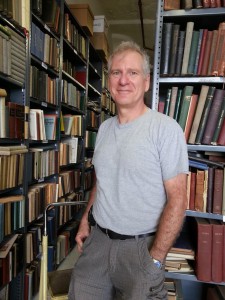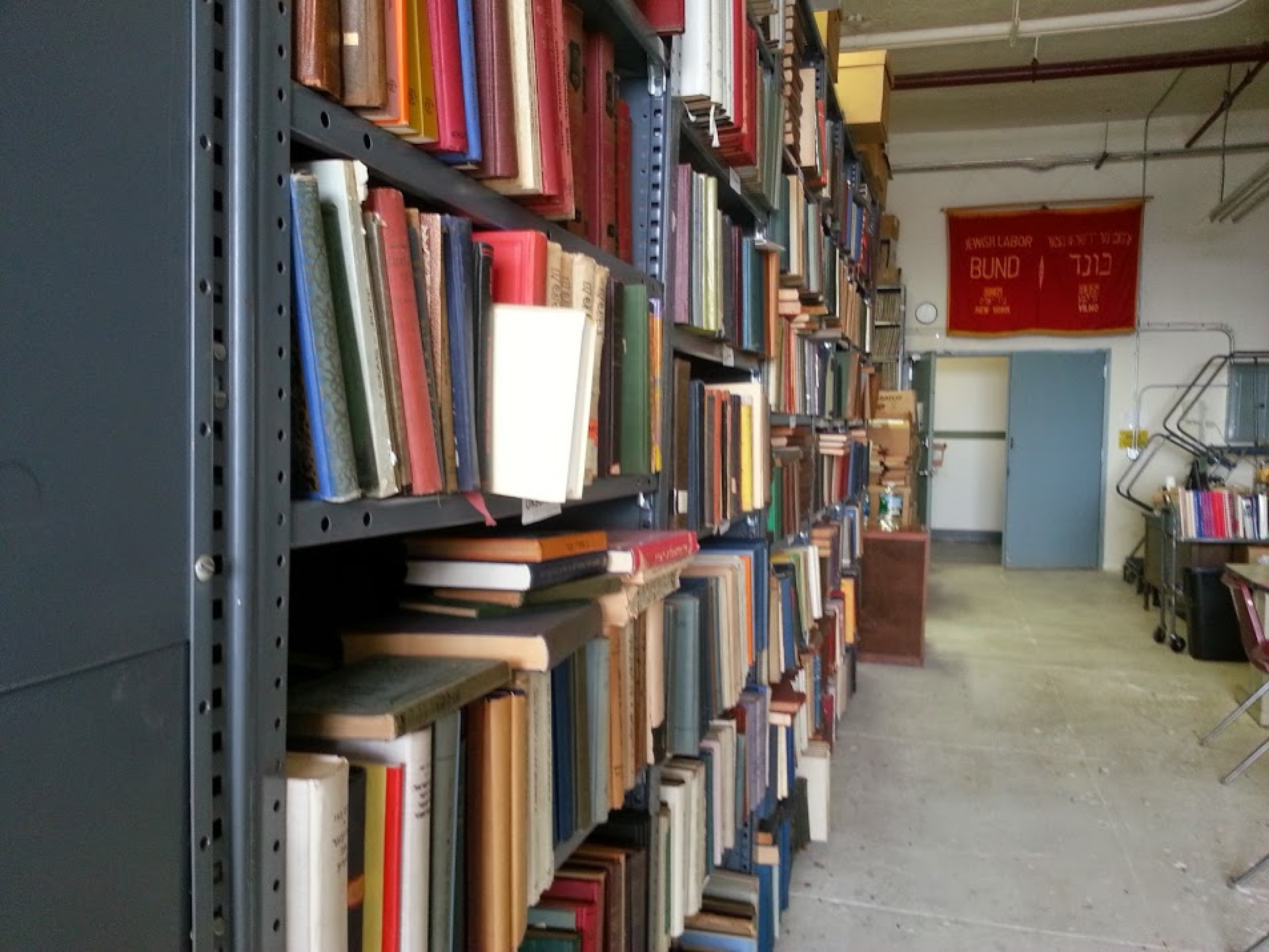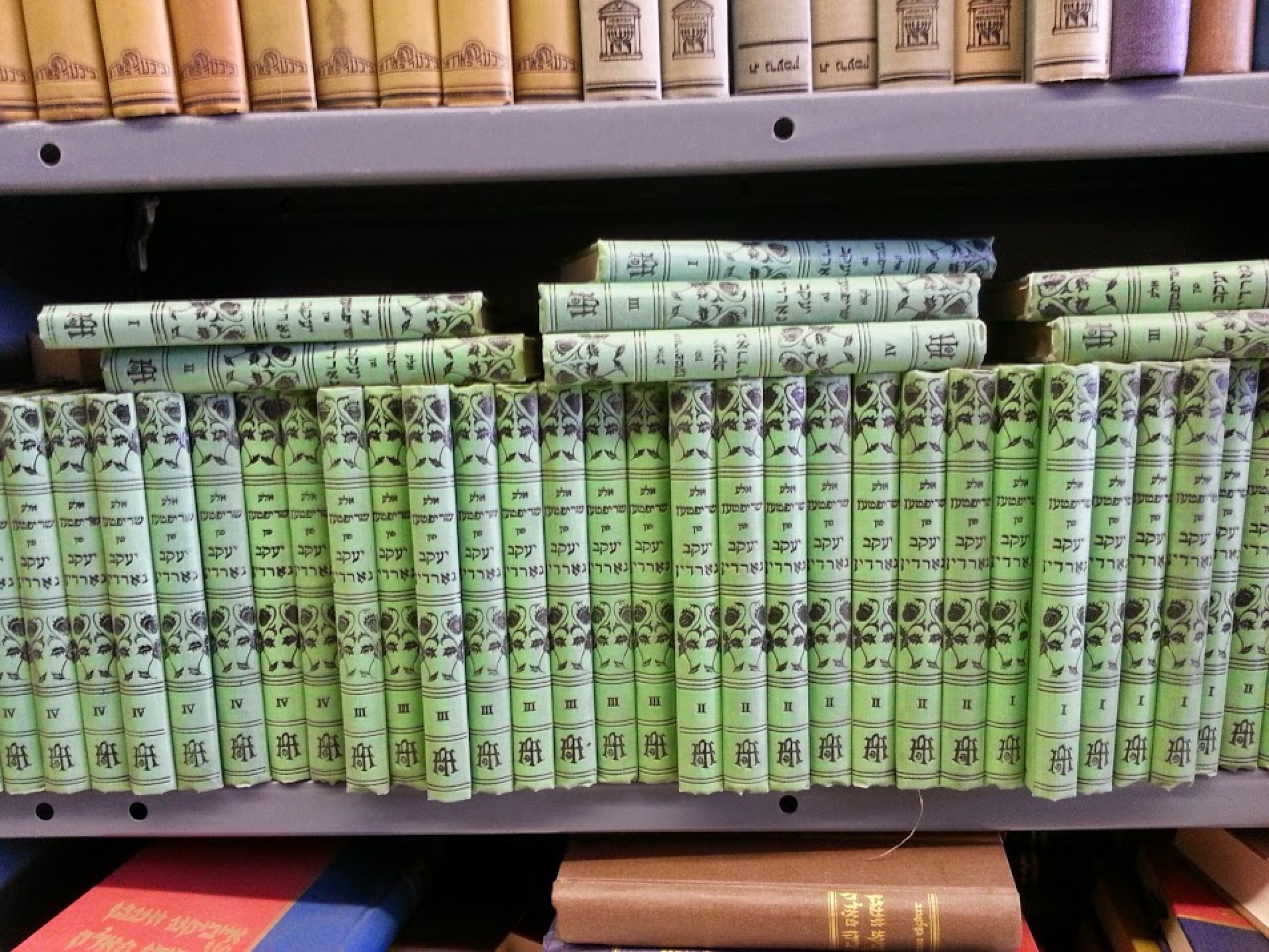This Belongs Here: Interview with Hy Wolfe in the CYCO Bookstore
 Hy Wolfe, director of the CYCO Bookstore.
Hy Wolfe, director of the CYCO Bookstore.On July 29, 2014, Yedies editor Roberta Newman visited the CYCO Yiddish bookstore in Long Island City, New York, where she spoke with Hy Wolfe about the history of CYCO (pronounced Tsiko) and overlooked Yiddish writers. In addition to serving as the director and sole employee of the bookstore, Wolfe is known for his work as an actor, singer, and director.
A few years ago, CYCO was forced to relocate from its longtime home in Manhattan to just across the East River in Queens. A short hop on the number 7 train from Times Square, the new headquarters is a large airy room in an industrial building, with a spectacular view of the New York City skyline and rows and rows of books on steel shelving. Visits are by appointment only but books can be mail ordered. There is a catalog of available books posted on the CYCO website but if you don’t find what you’re looking for there, it is advisable to send a direct inquiry to cycobooks@aol.com, since there are additional titles available for sale which are not listed online.
RN: Can you tell us something about the history of CYCO Bookstore?
HW: The Central Yiddish Culture Organization (CYCO) wasn’t established as a store. In 1937, it was organized as a way for the writers of the day to get together to write and have a safe place to meet, share ideas, and find a place to publish their poetry, their prose, their historical works, and their works in translation. I say “a safe place” because there were many political organizations back then and this was an opportunity to write and publish without any affiliation, without any fear of reprisal. And so CYCO was a place of ideas. Those who came together there also saw it as a venue to sell their books, and other writers and other organizations saw it as a place to take advantage of the non-affiliation to sell their materials. But the mission was to be a place of unaffiliated safety in which to get together to put your work out there.
Other publishing houses didn't necessarily embrace these writers. So we have thousands of writers of lesser renown on these shelves who had the bug to write. And those faynshmeker fun di hoykhe fenster—the faynshmeker [aesthetes] in "the high windows" of those great steeples of higher education—would say, "Well, this is not of a level, and this is not of a level" and "what a joke" and "let's laugh." They didn't open the doors of their connections and help their brethren. I pass no judgment one way or another. I understand that the cream will eventually rise to the top, and who are we to judge?
RN: But maybe the self-appointed elites who established the canon of Yiddish literature missed some great writers here.
HW: Exactly! Not maybe—it’s true. And they're waiting to be discovered.

RN: Who would you say are some undiscovered gems here? Who do you like, particularly?
HW: I like Miryam Ulinover. She has recently been rediscovered in France and the Medem Library has reissued some of her stuff and her writing is just incredible. I would say that she reads like Peretz Hirshbein, or like Yehoash, like poetry in prose. The words are just so wonderful; she's just so fabulous. But when I studied at the Jewish Theological Seminary and Columbia, they never mentioned her. I have nothing of hers anymore—it’s all sold out. But she was published by us.
So that's just one writer who sticks out in my head. Some of the ones that are more well-known that people frowned upon appealed to the masses, but didn't appeal to the elites. You could say that about Sholem Aleichem, that he was for the everyday readers, but yes, the elites did embrace him and see him. But if you talk about Moyshe Nadir, he appealed to the masses but did not appeal to today's hoykhe fenster profesorn [ivory tower professors]. Please excuse my Yiddish-inflected English!
We only have 267 copyrights of books. But we have tons of other stuff. There's no way of knowing what we have because people published it themselves and then came in with a box. "My father—here… I want to memorialize my mother's poetry. I want to memorialize my uncle."
RN: So some of these are self-published books?
HW: Thousands.
RN: I have a couple of these sorts of things at home. Some of them are beautifully printed.
HW: Yes, and there's no record of them, no ISBN, except if we go to the catalogs of the New York Public Library or YIVO, Harvard, or so forth. And I don't know if there is much knowledge of them out there. You know, you do have the Leksikon fun yidish shraybers (Encyclopedia of Yiddish writers), but there are people who are not in there. So their books are here and there may never be that connection made.
RN: What is one of the more recent books published by CYCO?
HW: We published the last of Beyle Schaechter Gottesman's works of poetry. And other people have asked us to share our expertise, such as Henny Wenkert, author of Love Poems of a Philanderer's Wife.
We don't have any money to publish anymore. I don't know when was the last time we had money to publish. In fact, I don’t know where our next year’s funding is coming from. People come and are constantly saying, "I have this manuscript. Can you publish it?" And I say, "No, I can't." Well, how does someone get published today? Basically, you need to go to a university press and have a proposal and put it out there and see if there is any interest. But even Beyle Gottesman's work was self-published, with her own money.
RN: What sets the CYCO Bookstore apart from other outlets for Yiddish books?
HW: I don't know of any other except for antiquarian booksellers like Dan Wyman Books, Abe Books, and Henry Hollander. Their prices are very high and they have incredible collections. And they are also having a hard time these days, to the best of my knowledge. And the Yiddish Book Center has an incredible collection.
RN: Are you, in fact, the only freestanding Yiddish bookstore in the world at this point?
HW: Yes. Except the Yiddish Book Center.
RN: But they do other things, too.
HW: Well, so do we. We’ve had readings here, we’ve had music concerts, we have visits from students. I've housed the entire cast of “The Twenty-Seventh Man” from the Public Theater, with Ron Rifkind here and Chip Zien and Nathan Englander, the writer. So a few years ago, they come in and they're doing a play about August 12, 1952, when Yiddish writers were executed in the Soviet Union. I gave them a little history of some of the writers.
RN: But these other places—they're selling books as just one slice of what they do. Your readings and other activities are very much in the tradition of independent bookstores. Is there any Yiddish bookstore that you know of in Argentina or Israel or anywhere in the world?
HW: No.
RN: So this is it?
HW: CYCO was a publisher and a cultural organization with a sideline as a bookstore. Before I took over it had already shrunk down to "well, we'll sell you the books now."
What separates us from other outlets for Yiddish books is that I believe the metropolitan area deserves one space where people can come and get together and have a reading of a Yiddish book, a concert. I can put out 45 seats. I can give them a view. I can't give them air conditioning unless somebody wants to come in and pay for it. And I can sell them a book.
I think that this belongs here. I don't think the day has come that we've outgrown or no longer have a use for Yiddish books.
Interview edited for length and clarity.





